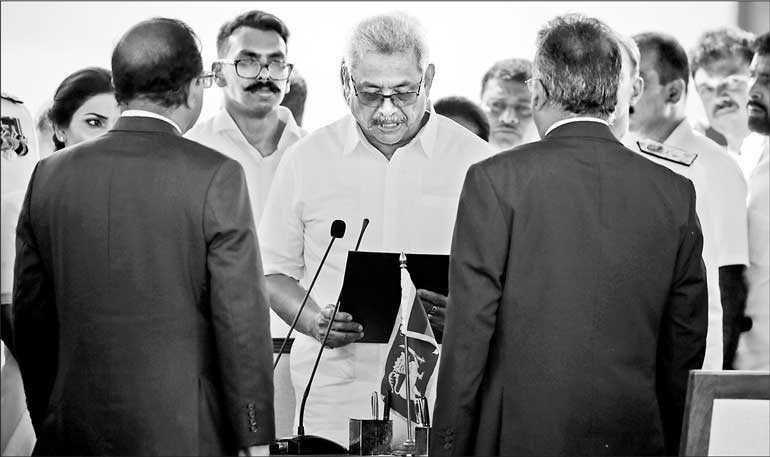Sunday Mar 01, 2026
Sunday Mar 01, 2026
Saturday, 23 November 2019 00:00 - - {{hitsCtrl.values.hits}}

Gotabaya Rajapaksa was elected the President of the Democratic Socialist Republic of Sri Lanka with an unprecedented majority in the recent Presidential Election. He polled 1,360,016 votes more than his opposing candidate Sajith Premadasa. 
Beyond these demographics, the result reflects another very significant phenomenon, demonstrating something which remained unclear for a long period of time. The election of a president depended on the backing of all the different voting groups, in particular the heavy support of minorities, mainly due to the divergent political panorama which existed in the South. But this time the voting patterns clearly showed that when the south decided to firmly back any candidate, he can emerge victorious without depending on the minority communal or racist groups.
While it is extremely bad to identify any group as a minority, the role played by political parties that represent them invariably causes this damage due to their divisive and separatist policies. The time has come for all of us to think in unison and mutual reciprocity among communal groups to propagate a broader conception and emerge thinking as Sri Lankans.
The country we live in belongs to all of us and the rights guaranteed to citizens are and should continue to be equal to all irrespective of any other distinctness. President Rajapaksa will, with his all-round exposure, pave the way for this new thinking to succeed as he openly declared during his address to the nation after being sworn in.
Situation after elections
The post-election situation appears to have given rise to several controversies.
The term of the current Parliament extends to August 2020 i.e. unless Parliament is dissolved sooner every Parliament shall continue for five years from its first meeting and no longer, and the expiry of the said period of five years shall operate as a dissolution of Parliament.
The Government in power, or to be more precise, the ruling group with a simple majority in Parliament, is from a different political party as the new President. According to the new Constitution, under the 19th Amendment, the earliest date by which the current parliament could be dissolved after a period of four years and six months of its existence by a presidential proclamation is 2 March 2020.
In accordance with the powers, duties and functions expressly conferred on the President by the constitution, the new President has to make the Statement of Government Policy in Parliament at the commencement of each session of Parliament, presiding at the Ceremonial sittings of Parliament.
According to the normal practice the Statement of Government Policy is subject to a debate in the Parliament following such a statement.
The President shall be a member of the Cabinet of Ministers and shall be the Head of the Cabinet of Ministers {Article 42(3) of the 19th Amendment}.
According to Article 42(4t The President shall appoint as Prime Minister the Member of Parliament, who in the President’s opinion, is most likely to command the confidence of Parliament.
Under these circumstances, if the President does not appoint a new Prime Minister he will be the head of the current Cabinet of Ministers headed by Prime Minister Ranil Wickremesinghe. And if he chooses to make a Statement of Government Policy it will be a policy statement of that Government. Isn’t this a highly controversial situation?
The Constitution before the 19th Amendment, under chapter XI, The Legislature (Procedure and Powers) Article 70 (1) (b) states as follows: “The President shall not dissolve Parliament on the rejection of the Statement of Government Policy at the commencement of the first session of Parliament after a General Election.”
This section has dealt with two issues; about the possibility for the Parliament to reject a Statement of Policy and that the President shall not dissolve the Parliament on such a rejection. For it to get rejected the Parliament will have to debate it and subject it to a vote. This section has been repealed under the 19th Amendment. But there is a need to make a Statement of Policy at the commencement of the new session in terms of the constitutional provisions even after the 19th Amendment. {Article 33(2) (a) and (b) of the 19th Amendment}
With regard to the Dissolution of Parliament the available options are as follows;
i) At the expiry of the period of five years from the date appointed for its first meeting and no longer, this period of five years shall operate as a dissolution of Parliament;
ii) When the President by Proclamation dissolve the Parliament any time after four years and six months from the date appointed for its first meeting;
iii) When the Parliament requests the President to do so by a resolution passed by not less than two-thirds of the whole number of members (including those not present), voting in its favour;
It follows from this that unless the Parliament passes a resolution for an early dissolution this Parliament will continue at least till 2 March 2020. If the President decides not to dissolve it early under his powers the Parliament can continue till August 2020.
Resignation of the PM and the Cabinet will not provide for a dissolution of the Parliament. It will only pave the way for the appointment of a new government under a new PM during the same Parliament. The possibility of the continuation of such a government will depend on the support and cooperation to be extended by the majority in Parliament. It remains a question as to how such a cooperation be secured. Unless there are manoeuvres and planned stratagem with conditional bargaining it will be extremely difficult to maintain an equilibrium at least till the earliest date enabling a mandatory dissolution under Presidential powers.
The best option available in such a context would be if the Parliament does not agree to pass a resolution for an immediate dissolution, to appoint a very small number of Cabinet of Ministers to a care-taker government and after the Government Policy Statement by the President made to the Parliament, to prorogue the parliament for a period of two months allowing the Care-Taker Cabinet to function to address the day to day affairs. The President has power to by Proclamation to summon, prorogue and dissolve Parliament subject to other provisions in the Constitution.
A Proclamation proroguing Parliament shall fix a date for the next session, not being more than two months after the date of the Proclamation. {Article 70(3)} While the Parliament stands prorogued, the President may by Proclamation dissolve Parliament subject to other provisions of this Article. The country and the overwhelming majority of the voters have given a clear mandate to the President to be the Head of the State, Head of the Executive and of the Government, and the Commander-in-Chief of the Armed Forces by electing the President to hold office for a term of five years starting from 19 November 2019. {Article 30(1) and (2) of the 19th Amendment}
The country cannot be under the mercy of a government rejected by the people. If the majority in Parliament fail to understand this reality and take appropriate steps to dissolve the parliament an alternate course of action with in the constitutional provisions has to be taken. The mandate the people gave to the President to be the Head of the Government has to be exercised in full. And if in the interest of the country the President has to take measures under the provisions of the constitution such steps will have to be taken forthwith if the circumstances compel.